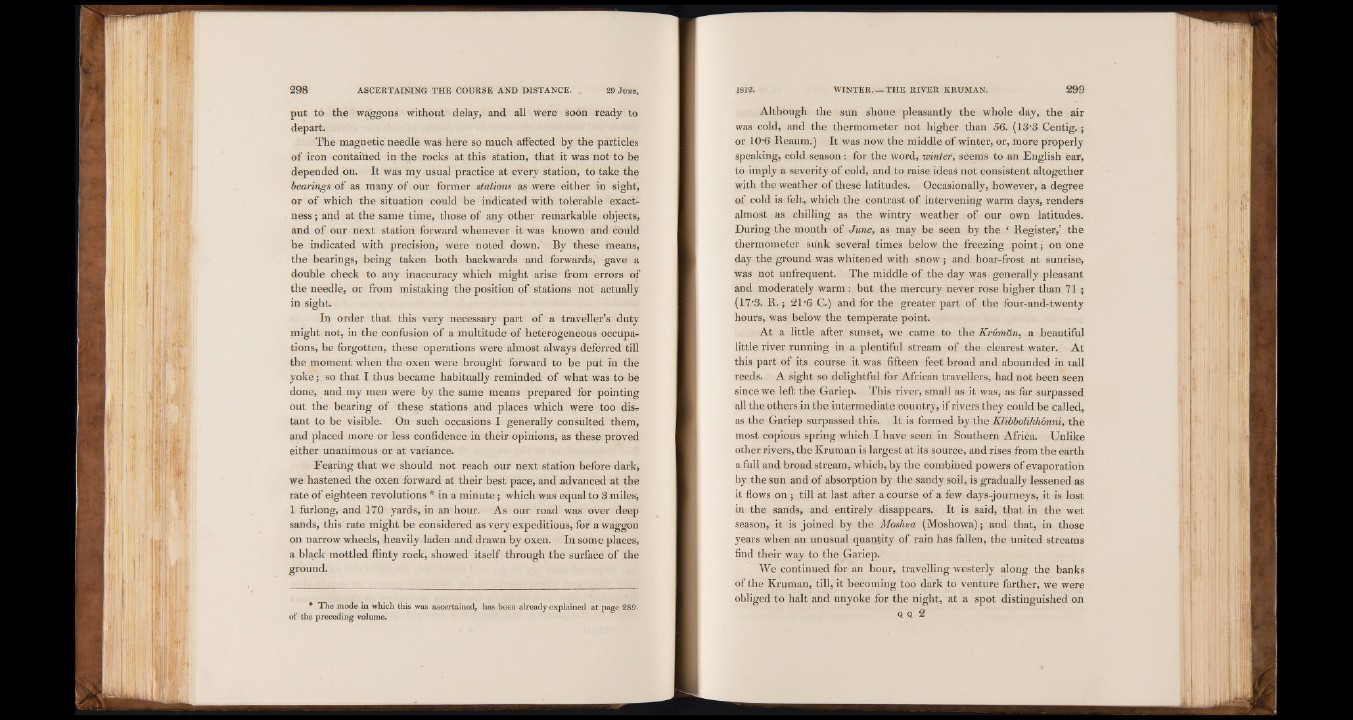
put to the waggons without delay, and all were soon ready to
depart.
The magnetic needle was here so much affected by the particles
of iron contained in the rocks at this station, that it was not to be
depended on. It was my usual practice at every station, to take the
bearings of as many of our former stations as were either in sight,
or of which the situation could be indicated with tolerable exactness
; and at the same time, those of any other remarkable objects,
and of our next station forward whenever it was known and could
be indicated with precision, were noted down, By these means,
the bearings, being taken both backwards and forwards, gave a
double check to any inaccuracy which might arise from errors of
the needle, or from mistaking the position of stations not actually
in sight.
In order that this very necessary part of a traveller’s duty
might not, in the confusion of a multitude of heterogeneous occupations,
be forgotten, these operations were almost always deferred till
the moment when the oxen were brought forward to be put in the
yoke; so that I thus became habitually reminded of what was to be
done, and my men were by the same means prepared for pointing
out the bearing of these stations and places which were too dis„
tant to be visible. On such occasions I generally consulted them,
and placed more or less confidence in their opinions, as these proved
either unanimous or at variance.
Fearing that we should not reach our next station before dark,
we hastened the oxen forward at their best pace, and advanced at the
rate of eighteen revolutions * in a minute; which was equal to 3 miles,
1 furlong, and 170 yards, in an hour. As our road was over deep
sands, this rate might be considered as very expeditious, for a waggon
on narrow wheels, heavily laden and drawn by oxen. In some places,
a black mottled flinty rock, showed itself through the surface of the
ground.
* The mode in which this was ascertained, has.been already explained at page 289.
of the preceding volume.
Although the sun shone pleasantly the whole day, the air
was cold, and the thermometer not higher than 56. (13'3 Centig.;
or 10-6 lieauin.) It was now the middle of winter, or, more properly
speaking, cold season : for the word, •winter, seems to an English ear,
to imply a severity of cold, and to raise ideas not consistent altogether
with the weather of these latitudes. Occasionally, however, a degree
of cold is felt, which the contrast of intervening warm days, renders
almost as chilling as the wintry weather of our own latitudes.
During the month of June, as may be seen by the | Register,’ the
thermometer sunk several times below the freezing point; on one
day the ground was whitened with snow; and hoar-frost at sunrise,
was not unfrequent.' The middle of the day was generally pleasant
and moderately warm: but the mercury never rose higher than 71 j
(17'3. R .; 21-6 C.) and for the greater part of the four-and-twenty
hours, was below the temperate point.
At a little after sunset, we came to the Krumtin, a beautiful
little river running in a plentiful stream of the clearest water. At
this part of its course it was fifteen feet broad and abounded in tall
reeds. A sight so delightful for African travellers, had not been seen
since we left the Gariep. This river, small as it was, as far surpassed
all the others in the intermediate country, if rivers they could be called,
as the Gariep surpassed this. It is formed by the Klibbolikhbnni, the
most copious spring which I have seen in Southern Africa. Unlike
other rivers, the Kruman is largest at its source, and rises from the earth
a full and broad stream, which, by the combined powers of evaporation
by the sun and of absorption by the sandy soil, is gradually lessened as
it flows on ; till at last after a course of a few days-journeys, it is lost
in the sands, and entirely disappears, It is said, that in the wet
season, it is joined by the Moshva (Moshowa); and that, in those
years when an unusual quantity of rain has fallen, the united streams
find their way to the Gariep.
We continued for an hour, travelling westerly along the banks
of the Kruman, till, it becoming too dark to venture farther, we were
obliged to halt and unyoke for the night, at a spot distinguished on
q q 2